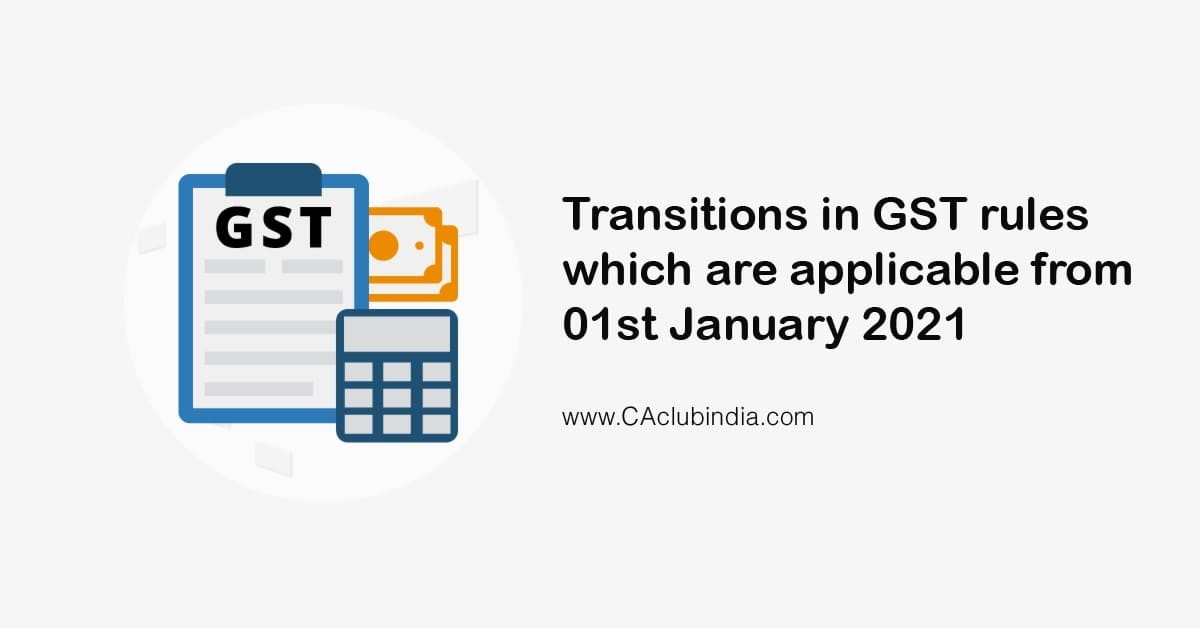Need to amend
With the increase in the number of fraudulent cases, fake invoicing by many concerns, and creation of dummy firms the GST department amends the CGST rules, 2017 that are made effective from 1st January 2021. These amendments are very important and crucial to understand by all businesses whether small or big, to comply with the GST laws of the country.
Some of the important changes or transitions that are notified by the departments are given below-:
ITC on debit notes
The period for availing ITC on debit notes has been changed from the date of the invoice to the date of the debit notes.
The QRMP Scheme
Introduction of the QRMP (Quarterly Return Monthly Payment) scheme for the registered person having turnover up-to 5crore in the preceding financial year. The option for availing of this facility is available till 31st January 2021 and if not selected to date then the default option is selected automatically.
Restriction in availing credit
There is a major change in rule 36(4) of the CGST Rules, 2017 which state the limit for availing provisional ITC. Earlier the limit prescribed by the rules is 10% of the credit available in GSTR-2B which has now been changed to 5% of the credit in GSTR-2B.

E-Invoicing
invoicing becomes compulsory applicable to the registered person having turnover more than INR 100crore in any financial year starting from 2017-2018.
Restriction in the utilization of credit
As per Rule 86B of the CGST Rules, 2017 every registered person having turnover of more than INR 50Lakhs in a month (other than exempt and zero-rated supplies) shall not utilize ITC to discharge his output tax liability in excess of 99% of such liability. In other words, the registered person is required to pay 1% of such liability in cash.
This restriction does not apply where-:
- the registered person has paid income-tax exceeding INR 100,000 in two preceding financial years;
- the registered person has received a refund exceeding INR 100,000 under section 54 of CGST Act 2017;
- the registered person has used electronic cash ledger to pay liability on outward supplies, which cumulatively makes 1% of the total liability up to the said month;
- A person is a Government Department, Public Sector Undertaking, local authority, or a statutory body.
Limitation for Filing of GSTR-1
The registered person is not allowed or is restricted to file GSTR-1 where-:
- For Monthly Taxpayers- where a taxpayer fails to file GSTR-3B for the preceding 2 months
- For Quarterly Taxpayers- where a taxpayer fails to file the GSTR-3B for the preceding quarter
- For taxpayers who are restricted to utilize ITC in excess of 99% - where a taxpayer fails to file the GSTR-3B for the preceding tax period.
The E way Bill validity and general law
The validity of an e-way bill distance has been enhanced to 200 Km from earlier 100 km for an e-way bill which is valid for one day. E way bill is restricted in the following cases-: where a taxpayer has defaulted in furnishing returns for consecutive two tax periods instead of two months.
If the registration of the registered person has been suspended as per the rule 21A (2) /2A
Cancellation or suspension of Registration
- The registration of the taxpayer is suspended or cancelled in the following cases-:
- Avails ITC in violation of section 16 or the rules made thereunder, or
- Furnishes details of outward supplies in GSTR-1 for one or more tax periods which is in excess of the output details declared by him in GSTR-3B, or
- Violates the provision of rule 86B.
A proper officer will suspend the registration of a person without giving him a reasonable opportunity of being heard, in cases where such officer has reason to believe that the registration is liable to be cancelled.
Conclusion
These amendments and transitions in the CGST Rules, 2017 by the government are much required for minimizing the tax evasion and leakages, but it may also cause hardships to some of the taxpayers that conduct their business genuinely and transparently.








 CAclubindia
CAclubindia

